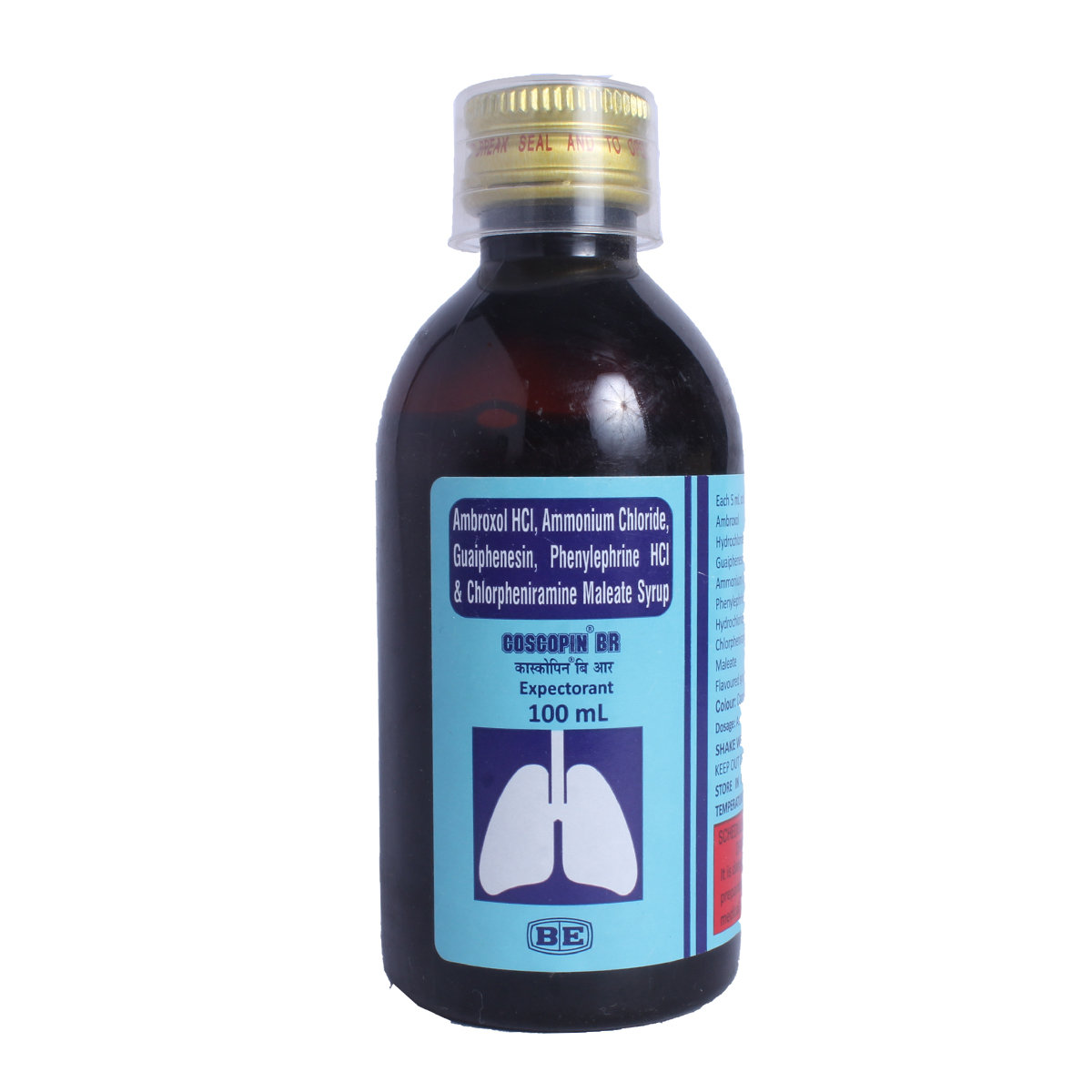Ammonium Chloride+chlorpheniramine+phenylephrine
About Ammonium Chloride+chlorpheniramine+phenylephrine
Ammonium Chloride+chlorpheniramine+phenylephrine belongs to the combination medication called 'anti-allergics' primarily used to treat symptoms caused by the common cold, flu, allergies and other breathing problems like sinusitis and bronchitis. An allergy is an immune system response to foreign elements typically not harmful to your body. These foreign elements are known as 'allergens'. Allergic condition varies from person to person. Some might be allergic to certain foods and seasonal allergies like hay fever. At the same time, others might be allergic to pollen or pet dander.
Ammonium Chloride+chlorpheniramine+phenylephrine contains Chlorpheniramine (anti-histamine/anti-allergic), Phenylephrine (decongestant) and Ammonium Chloride. Chlorpheniramine is an 'antihistamine' that blocks histamine release in the body, which is known to cause allergy symptoms like common cold symptoms. Phenylephrine is a 'decongestant' that helps shrink the blood vessels in the nasal passage, reducing a stuffy nose. Ammonium chloride decreases mucus stickiness. Together, Ammonium Chloride+chlorpheniramine+phenylephrine effectively reduces allergic symptoms.
Take Ammonium Chloride+chlorpheniramine+phenylephrine as prescribed by your doctor. You are advised to take Ammonium Chloride+chlorpheniramine+phenylephrine as long as your doctor has prescribed it for you, depending on your medical condition. The most common side effects of Ammonium Chloride+chlorpheniramine+phenylephrine are drowsiness, dizziness, headache, dry mouth/nose/throat, upset stomach, constipation, or trouble sleeping. Most of these side effects of Ammonium Chloride+chlorpheniramine+phenylephrine do not require medical attention and gradually resolve over time. However, if the side effects are persistent, reach out to your doctor.
Do not stop taking Ammonium Chloride+chlorpheniramine+phenylephrine even if you feel better without asking your doctor, as your symptoms may come back and even worsen your condition. Also, inform your doctor about all other medications you have taken before starting Ammonium Chloride+chlorpheniramine+phenylephrine. Please tell your doctor before starting Ammonium Chloride+chlorpheniramine+phenylephrine if you have a liver problem, are pregnant or breastfeeding. Ammonium Chloride+chlorpheniramine+phenylephrine may cause drowsiness and sleepiness, so it is advised not to drive a car or operate machinery. Consumption of alcohol should be avoided as it may lead to excessive drowsiness and sleepiness. Do not take Ammonium Chloride+chlorpheniramine+phenylephrine with any MAO inhibitor (anti-depressant medication) as it may lead to serious drug interaction.
Uses of Ammonium Chloride+chlorpheniramine+phenylephrine
Medicinal Benefits
Ammonium Chloride+chlorpheniramine+phenylephrine is primarily used to treat common cold symptoms. It is a combination drug containing Chlorpheniramine (anti-histamine/antiallergic), phenylephrine (decongestant) and Ammonium Chloride, primarily used to treat common cold symptoms like runny nose, congestion, watery eyes, and sneezing. Chlorpheniramine is an antihistamine that blocks histamine in the body, which is known to cause common cold symptoms. Phenylephrine helps shrink the blood vessels in the nasal passage, reducing a stuffy nose. Together, both of them effectively reduce allergic and cold symptoms.
Directions for Use
- Ammonium Chloride+chlorpheniramine+phenylephrine can be taken with or without food as advised by your doctor.
- Follow your doctor's instructions on the dosage and timing of this medication.
- Take the prescribed dose by mouth using the measuring cup/dosing syringe/dropper provided by the pack.
- Avoid using regular household spoons, as they may not measure the dose correctly. Shake well before use.
Storage
Side Effects of Ammonium Chloride+chlorpheniramine+phenylephrine
- Drowsiness
- Dizziness
- Headache
- Dry mouth/nose/throat
- Upset of stomach
- Constipation
- Trouble in sleeping
Drug Warnings
Do not take Ammonium Chloride+chlorpheniramine+phenylephrine if you are allergic to histamines, Ammonium Chloride+chlorpheniramine+phenylephrine, or any of its ingredients. Please inform your doctor if you are pregnant or breastfeeding before starting Ammonium Chloride+chlorpheniramine+phenylephrine. If you have or ever had cardiovascular disease, asthma, kidney or liver disease, diabetes, glaucoma, chronic obstructive pulmonary disease, or benign prostatic hyperplasia, please do not take Ammonium Chloride+chlorpheniramine+phenylephrine as it is known to interact. Also, inform your doctor about all other medications you have taken before starting Ammonium Chloride+chlorpheniramine+phenylephrine. Do not stop taking Ammonium Chloride+chlorpheniramine+phenylephrine even if you feel better without asking your doctor, as your symptoms may come back and even worsen your condition. Ammonium Chloride+chlorpheniramine+phenylephrine may cause drowsiness and sleepiness, so it is advised not to drive a car or operate machinery. Consumption of alcohol should be avoided as it may lead to excessive drowsiness and sleepiness. If you need to undergo surgery, please inform your doctor that you are taking Ammonium Chloride+chlorpheniramine+phenylephrine as it should not be taken during surgery. Do not take Ammonium Chloride+chlorpheniramine+phenylephrine if you have taken any MAO inhibitor (anti-depressant medication) in the past 14 days.
Drug Interactions
Drug-Drug Interaction: Ammonium Chloride+chlorpheniramine+phenylephrine have interactions with other anti-allergic medications (cetirizine, fluticasone, diphenhydramine), blood thinners (aspirin), cough suppressant medications (dextromethorphan), anti-hypertensive medications (atorvastatin), anti-asthma medications (albuterol), medicines used for stomach problems (pantoprazole), anti-depressants (isocarboxazid, tranylcypromine), antiparkinson (rasagiline), antibiotics (linezolid).
Drug-Food Interaction: Alcohol should not be used along with Ammonium Chloride+chlorpheniramine+phenylephrine.
Drug-Disease Interaction: Ammonium Chloride+chlorpheniramine+phenylephrine should not be taken by the people who have or ever had cardiovascular disease, asthma, kidney or liver disease, diabetes, glaucoma, chronic obstructive pulmonary disease, benign prostatic hyperplasia (BPH) or enlarged prostate gland, difficulty in urination, intestinal ulcer or blockage.
Drug-Drug Interactions Checker List:
Safety Advice

Alcohol
unsafeAmmonium Chloride+chlorpheniramine+phenylephrine may cause excessive dizziness when taken with alcohol, together intake should be avoided.

Pregnancy
cautionAmmonium Chloride+chlorpheniramine+phenylephrine should be used with caution in pregnancy as it may harm your foetus. If you are pregnant, please consult your doctor before taking Ammonium Chloride+chlorpheniramine+phenylephrine.

Breast Feeding
cautionAmmonium Chloride+chlorpheniramine+phenylephrine should be used with caution if you are breastfeeding. Please consult your doctor, your doctor will prescribe this medicine if the benefits outweigh the risks.

Driving
unsafeAmmonium Chloride+chlorpheniramine+phenylephrine is known to cause drowsiness and sleepiness. Hence, do not drive after taking this medicine until you are alert.

Liver
cautionAmmonium Chloride+chlorpheniramine+phenylephrine to be taken with caution, especially if you have a pre-existing or a history of liver disease. Your doctor may adjust the dose of this medicine based on your condition.

Kidney
cautionAmmonium Chloride+chlorpheniramine+phenylephrine to be taken with caution, especially if you have a pre-existing or a history of kidney disease. Your doctor may adjust the dose of this medicine based on your condition.

Children
cautionAmmonium Chloride+chlorpheniramine+phenylephrine is not recommended for children below the age of 4 years. For children above 4 years, use Ammonium Chloride+chlorpheniramine+phenylephrine only when prescribed by a child specialist. And also, take it in doses as prescribed, as any dose alteration can prove fatal.
Habit Forming
Diet & Lifestyle Advise
- Staying hydrated is vital for those with a cough or cold. Drinking liquids at room temperature can alleviate cough, runny nose and sneezing.
- The immune system is affected by stress and raises the risk of being sick. An individual can exercise regularly, meditate, do deep breathing and try progressive muscle relaxation techniques to relieve stress.
- To stay fit and safe, try to sleep at least 8 hours each night.
- It is advised to avoid contact with known allergens (allergy-causing agents) such as pollen, dust, etc. Certain food items are known to cause allergies to you.
- Maintain personal hygiene and keep your surroundings clean.
Special Advise
- It is advised to avoid contact with known allergens (allergy-causing agents) such as pollen, dust, etc. It might help reduce the severity of your symptoms.
- Ammonium Chloride+chlorpheniramine+phenylephrine may interfere with certain lab tests like brain scans for Parkinson's disease and urine drug screening tests. So before undergoing these tests, please let the doctor know that you are taking Ammonium Chloride+chlorpheniramine+phenylephrine.
Patients Concern
Disease/Condition Glossary
Common cold: The common cold is an infection caused by viruses, mainly 'rhinovirus' affecting your nose and throat (upper respiratory tract). Children younger than 6 years of age are at the most significant risk of colds, but healthy adults can also be affected by having 2-3 colds annually. In most cases, cold symptoms are recovered within a week or ten days. However, symptoms might last longer in people who smoke or are exposed to allergens like dust, pollutants, etc. Symptoms of a common cold might include a stuffy or runny nose, sore throat, cough, congestion, mild body pain or a mild headache, sneezing, low-grade fever, and feeling unwell (malaise). In some cases, the discharge from your nose may become thicker and yellow or green, which is not an indication of a bacterial infection. If you observe these symptoms, immediately contact your doctor.
Allergy: It is an immune system response to foreign elements typically not harmful to your body. These foreign elements are known as ‘allergens’. Allergic condition varies from person to person. Some might be allergic to certain foods and seasonal allergies like hay fever. At the same time, others might be allergic to pollen or pet dander. Ammonium Chloride+chlorpheniramine+phenylephrine is a non-drowsy antihistamine, making it less likely to make you sleepy than other antihistamines or antiallergics.
FAQs
Ammonium Chloride+chlorpheniramine+phenylephrine is used to treat common cold and allergy symptoms like runny nose, congestion, watery eyes, and sneezing.
Ammonium Chloride+chlorpheniramine+phenylephrine contains Chlorpheniramine, Phenylephrine and Ammonium Chloride. Chlorpheniramine blocks histamine in the body, which is known to cause common cold symptoms. Phenylephrine helps shrink the blood vessels in the nasal passage, reducing a stuffy nose. Ammonium chloride helps to reduce mucus. Together, they effectively reduce the symptoms of colds and allergies.
Consuming alcohol, along with Ammonium Chloride+chlorpheniramine+phenylephrine, may potentiate some of the pharmacologic effects of CNS-active agents. If used together, it may lead to symptoms like confusion, central nervous system depression, and impaired thinking and judgment.
No, you should not take Ammonium Chloride+chlorpheniramine+phenylephrine if you need to undergo surgery as it may lead to excessive drowsiness and sleepiness when given along with anaesthesia. Please inform your doctor before surgery if you are taking Ammonium Chloride+chlorpheniramine+phenylephrine as the doctor may stop it 72 hours before the surgery.
It is not recommended to take Ammonium Chloride+chlorpheniramine+phenylephrine along with any anti-depressant medication as it may lead to unpleasant side effects or any drug interaction. Also, Ammonium Chloride+chlorpheniramine+phenylephrine should be taken at least 15 days after your last dose of anti-depressants.
Ammonium Chloride+chlorpheniramine+phenylephrine is known to cause drowsiness and sleepiness. Hence, you are recommended to take it at night time if you are experiencing excessive drowsiness in the day and avoid driving a car or doing anything that requires mental alertness.






